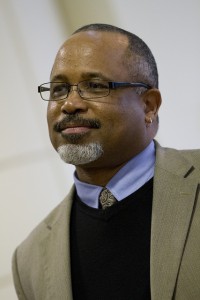Marcus C. Bruce ’77, Benjamin E. Mays Professor
 The Mays Professorship was established by Bates parents James F. Orr III (also a trustee emeritus) and Anne L. Orr. The professorship and a visiting scholars program honor the memory of the late civil rights leader, theologian and educator Benjamin E. Mays ‘20. The professorship is conferred on an individual whose teaching and scholarship affirm Mays’ ideals.
The Mays Professorship was established by Bates parents James F. Orr III (also a trustee emeritus) and Anne L. Orr. The professorship and a visiting scholars program honor the memory of the late civil rights leader, theologian and educator Benjamin E. Mays ‘20. The professorship is conferred on an individual whose teaching and scholarship affirm Mays’ ideals.
From remarks by Thomas F. Tracy, Phillips Professor of Religious Studies, at a March 8, 2012, reception honoring six Bates faculty members appointed to named professorships. (Read about the event.)
I have known Marcus an embarrassingly long time—I first met him when he was a student at Bates. It was his senior year, and my first year of full-time teaching. He enrolled in a seminar I was offering on a topic related to my dissertation research, and I shudder to think what the experience must have been like for the handful of students who were brave enough to sign up for a course with an over-prepared graduate student trying to figure out how to teach. But the students were mercifully patient, and Marcus was then, as we all now know him to be, gracious, open and good at making conversation an opportunity for a mutual (and often playful) exploration of ideas.
After graduation, Marcus spent a couple more years at Bates as part of the Admissions department “dream team”—a group that helped to transform the admissions process at the college and appreciably strengthen the student body.Then Marcus went off to Yale for graduate study, and when he was finishing his degree, we were lucky to be able to lure him back to Bates to join the faculty. The college rewarded him for his loyalty to his alma mater by giving him an office in the basement of Parker Hall (known at that time among the student body as “the nunnery”). Those basement offices had some special features: there was the noise of dorm life, and the occasional wandering student surprised to find herself in the midst of faculty offices. There was also a general dampness and lack of sunlight, and (related to that) a vigorous population of insects— the silverfish down there found that Marcus’s books provided a perfect place to live and eat and reproduce.
The contrast with our beautiful new spaces in Hedge could hardly be more dramatic. But I remember one aspect of the Parker era with real fondness, and that was the time spent with Marcus in that office talking about our lives as teachers and incipient scholars. We were both a bit younger then—and closer to the precarious transition from graduate study to the complicated double life of teaching and research. We’d get together to compare notes on our efforts to make something of value happen in class day by day, we’d confess (and often laugh together about) the strategies that didn’t work, and we’d talk about the ideas we were studying and teaching. Marcus was always exploring, always absorbing new material and folding it into his intellectual projects. So the exchange of ideas in the basement of the nunnery was lively and rich. Those conversations have continued over the years, and they are an important part of what makes life on this faculty so satisfying.
I know that many of you have similar histories with Marcus. He has contributed enormously to making Bates a place of vital intellectual life for faculty and students alike. We have drawn heavily (at times, I’m sure, too heavily) on his good will and good judgment, because we have known that we can count on his deep commitment to the shared values and goals of the college.
Marcus’ research has frequently taken him to France to study the life and work of American expatriates, including W.E.B. Du Bois and Henry Tanner, the focus of Marcus’ book. Marcus’ research on these topics continues to develop in fascinating new directions, and one of the things I envision for him as the Benjamin Mays Distinguished Professor is that he will have many more summers of satisfying exploration in the libraries — and archives, and cafes — of Paris.
Thank you, Marcus for your friendship and for your generous spirit over all these years. It is a great pleasure to see you become the first Benjamin E. Mays Professor. Congratulations!